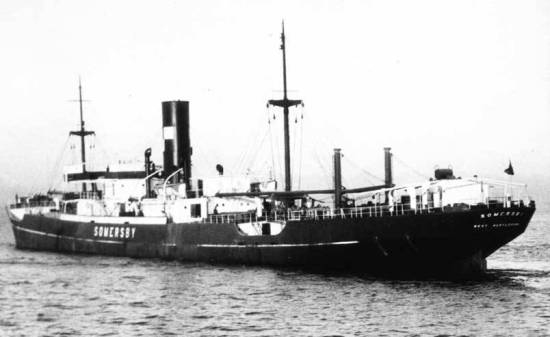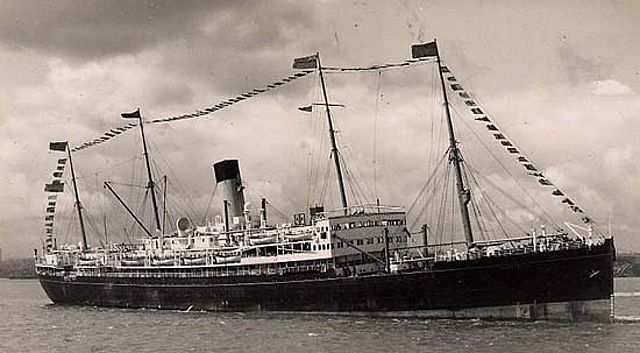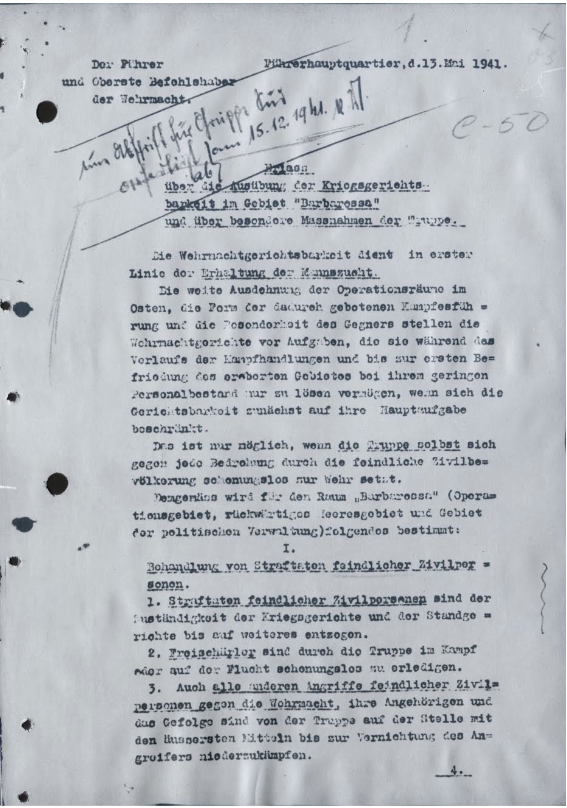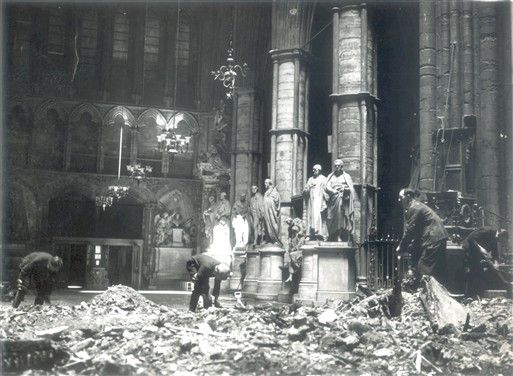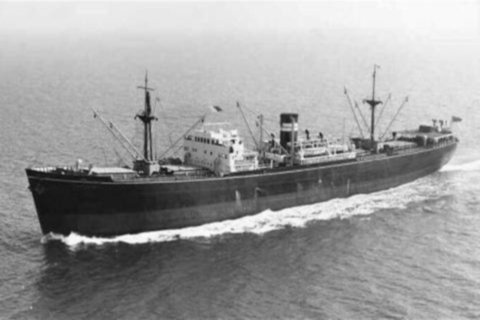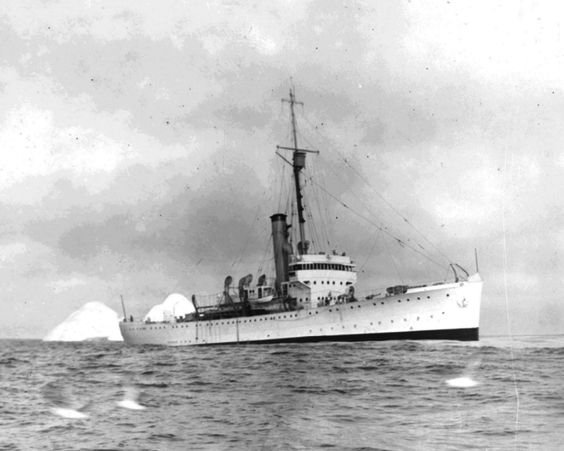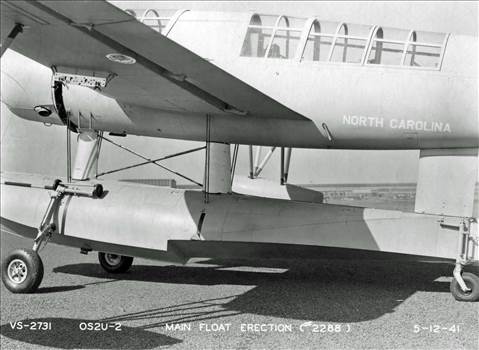Wednesday 14 May 1941
 |
| Jews rounded up in Paris on 14 May 1941 being transported to concentration camps. |
Anglo/Iraq War: The RAF on 14 May 1941 is keeping a very close eye on Syria, which is the obvious transit point for any German attempt to aid Rashid Ali in Iraq. A reconnaissance plane spots a Luftwaffe Junkers 90 transport operating out of Palmyra and confirms that there are many Axis transports at the airfield (they arrived from Greece on the 13th).
The RAF immediately sends three Blenheim bombers accompanied by two Curtiss Tomahawk (P-40) fighters (not held in high regard by the British, but they have an abundance of them) of RAF No. 250 Squadron to attack Palmyra and Aleppo airfields, both of which the Luftwaffe is using. This action is notable for the first operational use of a Curtiss Tomahawk in any theater, though the attack does not accomplish much. Just to add to the overall murkiness of relations between Vichy France and Great Britain, this is a completely illegal attack taken without warning and completely against previous informal understandings between the parties (the British, for instance, have not interfered previously with Vichy supply ships transiting from France to Syria and back). It also is the first round of hostilities that will lead to the conquest of Syria by the British and their allies.
Luftwaffe Special Force Junck (Sonderkommando Junck), under the command of Oberst (Colonel) Werner Junck, begins leaving Aleppo for Iraq. Three Bf 110s and three Heinkel He 111s, hastily converted to Iraqi war markings, land at Mosul. The main force, led by Oberst Junck, prepares to leave on the 15th.
European Air Operations: The RAF engages in Rhubarb operations along the French coast.
RAF No. 121 Squadron, an abortive World War I unit that disbanded during that conflict, reforms. A unit of Fighter Command, it is based at RAF Kirton-in-Lindsey. This is the second of three Eagle Squadrons (aka "the second Eagle squadron") manned by American volunteers flying Hawker Hurricanes.
East African Campaign: At Amba Alagi, the newly arrived South African 1st Infantry Brigade joins the battle begun on the 13th by the Indian troops. The Italian defenders feel the pressure and withdraw from a key position known as the "Triangle" during the night.
The East African 22nd Infantry Brigade reaches Shashamanna in Galla-Sidamo.
Battle of the Atlantic: German raider Atlantis, disguised as the Dutch motor-ship Brastagi, remains on the loose in the South Atlantic. Late on the 13th, it encounters 5618-ton British collier Rabaul. Captain Rogge of the Atlantis signals it to stop, but the Rabaul makes no change to course and speed. Then, Rogge fires a warning shot across the Rabaul's bow. The Rabaul then turns and tries to escape. Rogge opens fire, and early on the 14th, after numerous hits, the Rabaul sinks. There are seven dead and 47 survivors, though most of the survivors are in bad shape and two later perish as well. The Atlantis takes one survivor aboard and allows the rest to try to make landfall on their own.
The Luftwaffe bombs and sinks 96-ton British examination vessel M.A. West at the entrance to Great Yarmouth. There are no casualties.
The Luftwaffe bombs and badly damages 1843-ton Norwegian freighter Karlander in the Northwest Approaches. Everyone survives. The ship becomes a derelict and is sunk by a Royal Navy escort later in the day.
Royal Navy harbor defense patrol ship Minicoy hits a mine and sinks near St. Ann's Head. There are several deaths (no exact number).
German battleship Bismarck is engaging in exercises with light cruiser Leipzig to prepare for Operation Rheinübung when it develops issues with its port side crane and catapults. This delays the Atlantic sortie with cruiser Prinz Eugen, originally scheduled for the 18th, for three days.
Convoy HG 62 departs from Gibraltar bound for Liverpool.
Royal Navy aircraft carrier HMS Victorious is commissioned.
Royal Navy submarine HMS Thrasher (Lt. Patrick J. Cowell) is commissioned.
Canadian minesweeper HMCS Goderich and corvette New Westminster are launched, the former in Toronto, the latter in Victoria, B.C.
US destroyers USS Aulick and Charles Ausburne are laid down.
U-82 (Oberleutnant zur See Siegfried Rollmann) is commissioned.
Battle of the Mediterranean: This is a time of great activity in the British Middle East Command, though none of the operations are of a particularly high profile. There are three major issues on the "front burner" right now - aside from mopping up in Abyssinia, which also is a Middle East Command responsibility.
Operation Brevity: The British are set to launch Operation Brevity. This is a limited offensive aimed at pressing the Wehrmacht and Italian forces back in the region around Sollum and Fort Capuzzo south of Tobruk. The grand aim is to liberate Tobruk.
Syria: The RAF now has firm confirmation of Luftwaffe planes using the Aleppo, Syria airfield as a transit hub to Iraq. Syria is occupied by the Vichy French, and they have not been particularly cooperative with the British. The Chiefs of Staff tell Middle East Commander General Archibald Wavell to invade Syria as soon as possible. Wavell doesn't feel that he has sufficient strength, replying that an invasion will require an entire corps, including an armored division. Commander in chief of the Free French forces General Georges Catroux is in Cairo and plans to aid the invasion of Syria as a matter of national pride. Wavell is not too keen on De Gaulle's presence (and interference) in his theater due to De Gaulle's spotty record to date at Dakar and elsewhere, but Winston Churchill sends De Gaulle "a cordial invitation" to go to Cairo. De Gaulle orders the 1st Free French Fighter Squadron moved forward to support coming operations in Syria.
Crete: The British at this point have very solid information from their Ultra service that the Germans are going to invade Crete. The Wehrmacht has never been overly enthusiastic about Operation Mercury, the projected invasion of Crete, but it has to be completed soon. For one thing, Operation Barbarossa (projected to begin 22 June) is getting closer, and the high command doesn't need the distraction of a major operation going on in a secondary theater while all eyes are pointed east. So, somewhat reluctantly, the pace of preparation begins to pick up around this time. Operation Mercury will be one of the few land operations of the war controlled completely by the Luftwaffe, and Hermann Goering's prestige will be affected. So, massive resources are committed to an objective of fairly minor strategic importance, one of many islands in the Mediterranean whose main value lies primarily in depriving its use by the Royal Navy and RAF.
To prepare for the projected airborne invasion within the coming week, Luftwaffe VIII Fliegerkorps begins shifting ifs priority from shipping (which at this point means military supplies to Tobruk, Malta and Suda Bay in Crete) to RAF airfields on Crete. The Luftwaffe loses six Bf 109s in the air, while the RAF loses two Hawker Hurricanes in the air and a Hurricane and Fulmar on the ground. During attacks on Heraklion airfield, Luftwaffe Bf 110 ace Oberleutnant Sophus Baagoe is shot down and killed. Baagoe accumulated 14 victories in 95 missions.
The Cretan airfields are the key to Operation Mercury because the slow Junkers Ju 52s carrying Fallschirmjäger (paratroopers) will be very vulnerable to fighter interception during their daylight drops. In addition, the only Wehrmacht supply route during the lodgement phase will be through those same airfields. The original date for the operation was today, but delays in operations are not unusual, and the date for the attack is postponed. On Crete, the composite New Zealand 10th Infantry Brigade receives a new commander, Colonel Kippenberger.
British freighter SS Turkia catches fire for unknown reasons in its No. 3 hold and explodes in the Red Sea (at the Gulf of Suez near the Zafarana light) when its cargo of explosives catches fire. This incident sometimes is dated 17 May. The site becomes popular with wreck divers.
The Luftwaffe attacks Suda Bay, Crete, and bombs 6343-ton British freighter Dalesman. The ship's master grounds the ship to avoid sinking, and the Germans later will repair and refloat the ship for their own use.
The Luftwaffe attacks Port Said and damages 5643-ton British freighter Cape Horn.
A very large force, including battleships HMS Barham and Queen Elizabeth, sails from Alexandria. This is Forces A and D for the defense of Crete.
Royal Navy gunboat Gnat operates off Tobruk Harbour and shells a German mobile artillery position.
Royal Navy submarine HMS Unbeaten spots two Italian schooners off the Libyan coast and attacks them with a torpedo and gunfire. However, both vessels escape.
At Malta, the Luftwaffe changes tactics slightly and begins using Bf-109s as fighter-bombers (Jabos). Regular bombers, typically Junkers Ju 88s, also continue missions. The British note that this tactic is producing good results for the Germans.
Convoy AS-31 departs from Suda Bay, Crete. This convoy carries about £7,000,000 sterling of Greek bullion. The convoy's destination is Port Said.
Battle of the Indian Ocean: German raider Kormoran, having entered the Indian Ocean from the Atlantic, makes a rendezvous with whaling ship Adjutant and supply ship Alstertor.
Battle of the Pacific: New Zealand 927 ton auxiliary minesweeping trawler HMNZS Puriri hits a mine and sinks about 8 miles northeast of Bream Head (near Auckland). There are five deaths, the survivors are picked up by nearby warships.
Spy Stuff: Karl Richter, a German spy who parachuted into woods north of London on 13 May, is walking along a road when a lorry driver stops to ask him directions. Richter, of course, has no idea where he is, let alone how to direct someone to their destination, so he is of no help. The lorry driver thinks about it as he drives off, and decides to tell the local police about the strange man who had no idea where he was. The police quickly apprehend Richter and end his brief career as a spy.
German/Soviet Relations: Adolf Hitler already has sent "Mr. Stalin" a letter dated 31 December 1940. Today, Hitler sends Stalin a second letter. As in the earlier letter, he vows to finish the "final shattering of England." However, he claims that "the German people consider the English a fraternal people" and that opposition to an invasion of the British Isles has arisen. He states:
Anglo/US Relations: British Prime Minister Winston Churchill sends a cable to President Roosevelt about current issues. You might think that this would include a review of what he has learned from Deputy Führer Rudolf Hess, now lying under guard in a military hospital in Glasgow - but Hess receives only a cursory mention at the end of the communication, "I will send you a special report about Hess shortly." The rest of the communication is devoted to emphasizing how "important" it is that the US "go forward with all your plans for supplying our Middle Eastern Armies by American ships to Suez."
Churchill also casually mentions that the Germans are using Syrian airfields - but does not indicate any decisions are being made about that. This Churchill does as he is telling his War Cabinet that Syria must be conquered, and soon. The cable is a study in downplaying the significance of major issues in order not to strain the alliance.
British Military: The Home Guard is one year old today, and the King issues an order of the day congratulating it. There are about 1.5 million men in the Home Guard, organized into 1200 battalions spread out across the length and breadth of Britain. Much has changed in the last year, and they now sport standard arms (rifles and Thompson submachine guns). The Home Guard is given the honor today of guarding Buckingham Palace.
The British fire fighting system has been put under enormous strain during the Blitz. The 10/11 May bombing of London, the largest Luftwaffe raid on London throughout the war, has put into stark relief the disorganization and inefficiency of having local fire fighting services that operate independently and often require payment before they will go to a neighboring city's aid. Home Secretary Herbert Morrison today nationalizes the nation's fire services in order to make it more responsive and efficient. This standardization gives authorities greater control over fire fighting capabilities and eliminates confusion.
Lord Gort becomes Governor of Gibraltar.
British Government: At the evening War Cabinet meeting, Winston Churchill and his cronies run through the major issues of the moment. According to the minutes, they conclude:
German Government: The northern part of the Red Sea is declared a zone of military operations, and the entire Red Sea a danger area. This mirrors a similar decision by the Americans, who earlier declared the Red Sea a war zone under the Neutrality Act (but revoked that designation on 12 April 1941). The declaration today by the Germans has no practical effect, though it apparently is related to their designs on Iraq.
Vichy French Government: Vice Premier Admiral Darlan, who basically is running the government with Marshal Petain as a figurehead, informs Petain that it is necessary to collaborate with the Reich so as to retain some degree of independence. The fear is that there will be "Polandization," or vast annexations accompanied by placing the French citizenry in a state of virtual slavery.
Yugoslavia: The Archbishop of Zagreb, Aloysius Stepinac, sends a letter of protest to Croat nationalist and fascist Ante Pavelić after hearing of the killings in recent days at Glina. Stepinac, however, does not mention the incident publicly. Pavelić ignores the letter and decides to maintain a scheduled visit to the Pope in Rome on the 15th.
Greece: Bulgaria annexes large portions of Greek Thrace and Macedonia without asking Hitler.
Bolivia: The government seizes Lloyd Aéreo Boliviano and reorganizes it as a state-owned company. This is not the first time Bolivia has nationalized the airline, as it did the same thing during the 1932 Chaco War with Paraguay, but this change is permanent. From this point forward until its demise in 2007-2010, it is the flag carrier of Bolivia.
China: In the continuing Battle of South Shanxi, the Japanese North China Front Army completes its conquest of the north bank of Yellow River. There are still some remnants of the Chinese 1st War Area in the area that are trying to escape in small groups to begin guerrilla operations
Holocaust: The Vichy French in Paris imprison many Jews (figures vary, between 1000-3700 and even perhaps up to 5000) between the ages of 18 and 40 who have been told to register. The French hand them over to the Gestapo. These prisoners ultimately wind up at camps at Pithiviers and Beaune-la-Rolande.
Romania passes laws compelling adult Jews to perform manual labor.
In the Netherlands, the German occupation authorities ban the playing of Jewish music.
French Homeland: Vice Premier Admiral Darlan makes a radio broadcast urging collaboration with the Reich.
American Homeland: Quality Comics (later acquired by DC Comics) introduces Plastic Man in Police Comics #1. Note that, although the cover is dated August 1941, the issue actually appears for sale today, 14 May 1941. This misdating is fairly typical at this time with comic books for marketing purposes.
"Major Barbara," a film starring Wendy Hiller in the title role and Rex Harrison, is released. It is a typical "switching lives" film in which a millionaire and Salvation Army worker experience each other's lives for a day, changing them forever.
May 1941
May 1, 1941: British Hold Tobruk
May 2, 1941: Anglo-Iraq War
May 3, 1941: Liverpool Hammered
May 4, 1941: Hitler Victory Speech
May 5, 1941: Patriots Day
May 6, 1941: Stalin In Command
May 7, 1941: May Blitz
May 8, 1941: Pinguin Sunk
May 9, 1941: U-110 Captured
May 10, 1941: Hess Flies Into History
May 11, 1941: The Hess Peace Plan
May 12, 1941: Tiger Arrives Safely
May 13, 1941: Keitel's Illegal Order
May 14, 1941: Holocaust in Paris
May 15, 1941: Operation Brevity
May 16, 1941: Blitz Ends
May 17, 1941: Habbaniya Relieved
May 18, 1941: Croatia Partitioned
May 19, 1941: Bismarck at Sea
May 20, 1941: Invasion of Crete
May 21, 1941: Robin Moore Sinking
May 22, 1941: Royal Navy Destruction Off Crete
May 23, 1941: Crete Must Be Won
May 24, 1941: Bismarck Sinks Hood
May 25, 1941: Lütjens' Brilliant Maneuver
May 26, 1941: Bismarck Stopped
May 27, 1941: Bismarck Sunk
May 28, 1941: Crete Lost
May 29, 1941: Royal Navy Mauled Off Crete
May 30, 1941: Sorge Warns, Stalin Ignores
May 31, 1941: British Take Baghdad
2020
The RAF immediately sends three Blenheim bombers accompanied by two Curtiss Tomahawk (P-40) fighters (not held in high regard by the British, but they have an abundance of them) of RAF No. 250 Squadron to attack Palmyra and Aleppo airfields, both of which the Luftwaffe is using. This action is notable for the first operational use of a Curtiss Tomahawk in any theater, though the attack does not accomplish much. Just to add to the overall murkiness of relations between Vichy France and Great Britain, this is a completely illegal attack taken without warning and completely against previous informal understandings between the parties (the British, for instance, have not interfered previously with Vichy supply ships transiting from France to Syria and back). It also is the first round of hostilities that will lead to the conquest of Syria by the British and their allies.
Luftwaffe Special Force Junck (Sonderkommando Junck), under the command of Oberst (Colonel) Werner Junck, begins leaving Aleppo for Iraq. Three Bf 110s and three Heinkel He 111s, hastily converted to Iraqi war markings, land at Mosul. The main force, led by Oberst Junck, prepares to leave on the 15th.
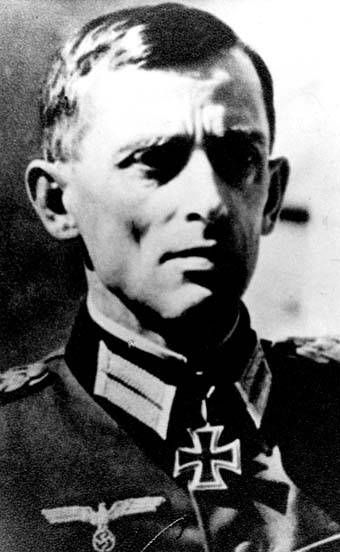 |
| Oberst Heinrich Kodre receives the Knights Cross on 14 May 1941 for leading his battalion to victory against fort "Hellas" of the Metaxas Line on 7 April 1941. |
RAF No. 121 Squadron, an abortive World War I unit that disbanded during that conflict, reforms. A unit of Fighter Command, it is based at RAF Kirton-in-Lindsey. This is the second of three Eagle Squadrons (aka "the second Eagle squadron") manned by American volunteers flying Hawker Hurricanes.
East African Campaign: At Amba Alagi, the newly arrived South African 1st Infantry Brigade joins the battle begun on the 13th by the Indian troops. The Italian defenders feel the pressure and withdraw from a key position known as the "Triangle" during the night.
The East African 22nd Infantry Brigade reaches Shashamanna in Galla-Sidamo.
Battle of the Atlantic: German raider Atlantis, disguised as the Dutch motor-ship Brastagi, remains on the loose in the South Atlantic. Late on the 13th, it encounters 5618-ton British collier Rabaul. Captain Rogge of the Atlantis signals it to stop, but the Rabaul makes no change to course and speed. Then, Rogge fires a warning shot across the Rabaul's bow. The Rabaul then turns and tries to escape. Rogge opens fire, and early on the 14th, after numerous hits, the Rabaul sinks. There are seven dead and 47 survivors, though most of the survivors are in bad shape and two later perish as well. The Atlantis takes one survivor aboard and allows the rest to try to make landfall on their own.
The Luftwaffe bombs and sinks 96-ton British examination vessel M.A. West at the entrance to Great Yarmouth. There are no casualties.
The Luftwaffe bombs and badly damages 1843-ton Norwegian freighter Karlander in the Northwest Approaches. Everyone survives. The ship becomes a derelict and is sunk by a Royal Navy escort later in the day.
Royal Navy harbor defense patrol ship Minicoy hits a mine and sinks near St. Ann's Head. There are several deaths (no exact number).
German battleship Bismarck is engaging in exercises with light cruiser Leipzig to prepare for Operation Rheinübung when it develops issues with its port side crane and catapults. This delays the Atlantic sortie with cruiser Prinz Eugen, originally scheduled for the 18th, for three days.
Convoy HG 62 departs from Gibraltar bound for Liverpool.
Royal Navy aircraft carrier HMS Victorious is commissioned.
Royal Navy submarine HMS Thrasher (Lt. Patrick J. Cowell) is commissioned.
Canadian minesweeper HMCS Goderich and corvette New Westminster are launched, the former in Toronto, the latter in Victoria, B.C.
US destroyers USS Aulick and Charles Ausburne are laid down.
U-82 (Oberleutnant zur See Siegfried Rollmann) is commissioned.
 |
| Australian Army 6th Division soldiers entraining at El Kantara station, Egypt on 14 May 1941. |
Operation Brevity: The British are set to launch Operation Brevity. This is a limited offensive aimed at pressing the Wehrmacht and Italian forces back in the region around Sollum and Fort Capuzzo south of Tobruk. The grand aim is to liberate Tobruk.
Syria: The RAF now has firm confirmation of Luftwaffe planes using the Aleppo, Syria airfield as a transit hub to Iraq. Syria is occupied by the Vichy French, and they have not been particularly cooperative with the British. The Chiefs of Staff tell Middle East Commander General Archibald Wavell to invade Syria as soon as possible. Wavell doesn't feel that he has sufficient strength, replying that an invasion will require an entire corps, including an armored division. Commander in chief of the Free French forces General Georges Catroux is in Cairo and plans to aid the invasion of Syria as a matter of national pride. Wavell is not too keen on De Gaulle's presence (and interference) in his theater due to De Gaulle's spotty record to date at Dakar and elsewhere, but Winston Churchill sends De Gaulle "a cordial invitation" to go to Cairo. De Gaulle orders the 1st Free French Fighter Squadron moved forward to support coming operations in Syria.
Crete: The British at this point have very solid information from their Ultra service that the Germans are going to invade Crete. The Wehrmacht has never been overly enthusiastic about Operation Mercury, the projected invasion of Crete, but it has to be completed soon. For one thing, Operation Barbarossa (projected to begin 22 June) is getting closer, and the high command doesn't need the distraction of a major operation going on in a secondary theater while all eyes are pointed east. So, somewhat reluctantly, the pace of preparation begins to pick up around this time. Operation Mercury will be one of the few land operations of the war controlled completely by the Luftwaffe, and Hermann Goering's prestige will be affected. So, massive resources are committed to an objective of fairly minor strategic importance, one of many islands in the Mediterranean whose main value lies primarily in depriving its use by the Royal Navy and RAF.
 |
| Oberleutnant Sophus Baagoe, KIA 14 May 1941. |
The Cretan airfields are the key to Operation Mercury because the slow Junkers Ju 52s carrying Fallschirmjäger (paratroopers) will be very vulnerable to fighter interception during their daylight drops. In addition, the only Wehrmacht supply route during the lodgement phase will be through those same airfields. The original date for the operation was today, but delays in operations are not unusual, and the date for the attack is postponed. On Crete, the composite New Zealand 10th Infantry Brigade receives a new commander, Colonel Kippenberger.
British freighter SS Turkia catches fire for unknown reasons in its No. 3 hold and explodes in the Red Sea (at the Gulf of Suez near the Zafarana light) when its cargo of explosives catches fire. This incident sometimes is dated 17 May. The site becomes popular with wreck divers.
The Luftwaffe attacks Suda Bay, Crete, and bombs 6343-ton British freighter Dalesman. The ship's master grounds the ship to avoid sinking, and the Germans later will repair and refloat the ship for their own use.
The Luftwaffe attacks Port Said and damages 5643-ton British freighter Cape Horn.
A very large force, including battleships HMS Barham and Queen Elizabeth, sails from Alexandria. This is Forces A and D for the defense of Crete.
Royal Navy gunboat Gnat operates off Tobruk Harbour and shells a German mobile artillery position.
Royal Navy submarine HMS Unbeaten spots two Italian schooners off the Libyan coast and attacks them with a torpedo and gunfire. However, both vessels escape.
At Malta, the Luftwaffe changes tactics slightly and begins using Bf-109s as fighter-bombers (Jabos). Regular bombers, typically Junkers Ju 88s, also continue missions. The British note that this tactic is producing good results for the Germans.
Convoy AS-31 departs from Suda Bay, Crete. This convoy carries about £7,000,000 sterling of Greek bullion. The convoy's destination is Port Said.
Battle of the Indian Ocean: German raider Kormoran, having entered the Indian Ocean from the Atlantic, makes a rendezvous with whaling ship Adjutant and supply ship Alstertor.
 |
| HMNZS Puriri, sunk on 14 May 1941 near Auckland by a mine. |
Spy Stuff: Karl Richter, a German spy who parachuted into woods north of London on 13 May, is walking along a road when a lorry driver stops to ask him directions. Richter, of course, has no idea where he is, let alone how to direct someone to their destination, so he is of no help. The lorry driver thinks about it as he drives off, and decides to tell the local police about the strange man who had no idea where he was. The police quickly apprehend Richter and end his brief career as a spy.
 |
| Royal Canadian Air Force Curtiss Tomahawks. |
In order to organize troops for the invasion away from the eyes of the English opponent, and in connection with the recent operations in the Balkans, a large number of my troops, about eighty divisions, are located on the borders of the Soviet Union.Citing "rumors" that he plans a coming "conflict" between Germany and the Soviet Union, Hitler writes:
I assure you, on my honor as a chief of state that this is not the case.He then promises that "By approximately June 15–20 I plan to begin a massive transfer of troops to the west from your borders." He concludes that he has "hope for a meeting in July."
Anglo/US Relations: British Prime Minister Winston Churchill sends a cable to President Roosevelt about current issues. You might think that this would include a review of what he has learned from Deputy Führer Rudolf Hess, now lying under guard in a military hospital in Glasgow - but Hess receives only a cursory mention at the end of the communication, "I will send you a special report about Hess shortly." The rest of the communication is devoted to emphasizing how "important" it is that the US "go forward with all your plans for supplying our Middle Eastern Armies by American ships to Suez."
Churchill also casually mentions that the Germans are using Syrian airfields - but does not indicate any decisions are being made about that. This Churchill does as he is telling his War Cabinet that Syria must be conquered, and soon. The cable is a study in downplaying the significance of major issues in order not to strain the alliance.
British Military: The Home Guard is one year old today, and the King issues an order of the day congratulating it. There are about 1.5 million men in the Home Guard, organized into 1200 battalions spread out across the length and breadth of Britain. Much has changed in the last year, and they now sport standard arms (rifles and Thompson submachine guns). The Home Guard is given the honor today of guarding Buckingham Palace.
The British fire fighting system has been put under enormous strain during the Blitz. The 10/11 May bombing of London, the largest Luftwaffe raid on London throughout the war, has put into stark relief the disorganization and inefficiency of having local fire fighting services that operate independently and often require payment before they will go to a neighboring city's aid. Home Secretary Herbert Morrison today nationalizes the nation's fire services in order to make it more responsive and efficient. This standardization gives authorities greater control over fire fighting capabilities and eliminates confusion.
Lord Gort becomes Governor of Gibraltar.
British Government: At the evening War Cabinet meeting, Winston Churchill and his cronies run through the major issues of the moment. According to the minutes, they conclude:
- Syria - "we must do everything possible to organize a force to go into Syria to support the air action."
- Vichy France - "it must be made clear to the Vichy Government how we regarded the situation.... the French in Tunis had assisted the Germans.... the French authorities were conniving at German infiltration into Syria."
- Canary and Cape Verde Islands in the Atlantic - "in view of the present situation [Churchill] could not allow the Expedition [Operation Puma, occupation of the islands] to sail now."
- Crete - "we regarded Operation Scorcher [the defense of Crete] as holding a higher priority even than the interruption of enemy supplies to Tripoli."
Churchill rings Foreign Secretary Anthony Eden up in the middle of the night proposing to inform the House about Rudolf Hess. Eden protests strongly saying it is best to say nothing. After much back-and-forth, Churchill agrees with ill humor and hangs up on Eden.
 |
| A Jew arrested in Paris on 14 May 1941 and sent to a concentration camp. |
Vichy French Government: Vice Premier Admiral Darlan, who basically is running the government with Marshal Petain as a figurehead, informs Petain that it is necessary to collaborate with the Reich so as to retain some degree of independence. The fear is that there will be "Polandization," or vast annexations accompanied by placing the French citizenry in a state of virtual slavery.
Yugoslavia: The Archbishop of Zagreb, Aloysius Stepinac, sends a letter of protest to Croat nationalist and fascist Ante Pavelić after hearing of the killings in recent days at Glina. Stepinac, however, does not mention the incident publicly. Pavelić ignores the letter and decides to maintain a scheduled visit to the Pope in Rome on the 15th.
Greece: Bulgaria annexes large portions of Greek Thrace and Macedonia without asking Hitler.
Bolivia: The government seizes Lloyd Aéreo Boliviano and reorganizes it as a state-owned company. This is not the first time Bolivia has nationalized the airline, as it did the same thing during the 1932 Chaco War with Paraguay, but this change is permanent. From this point forward until its demise in 2007-2010, it is the flag carrier of Bolivia.
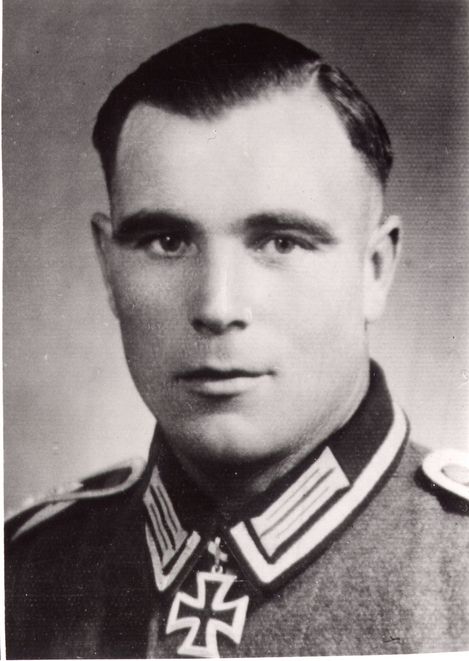 |
| Walter Meyer receives the Knights Cross today for services in Greece as Oberfeldwebel (shock troops leader) in the 7./Infanterie-Regiment 125. |
Holocaust: The Vichy French in Paris imprison many Jews (figures vary, between 1000-3700 and even perhaps up to 5000) between the ages of 18 and 40 who have been told to register. The French hand them over to the Gestapo. These prisoners ultimately wind up at camps at Pithiviers and Beaune-la-Rolande.
Romania passes laws compelling adult Jews to perform manual labor.
In the Netherlands, the German occupation authorities ban the playing of Jewish music.
French Homeland: Vice Premier Admiral Darlan makes a radio broadcast urging collaboration with the Reich.
American Homeland: Quality Comics (later acquired by DC Comics) introduces Plastic Man in Police Comics #1. Note that, although the cover is dated August 1941, the issue actually appears for sale today, 14 May 1941. This misdating is fairly typical at this time with comic books for marketing purposes.
"Major Barbara," a film starring Wendy Hiller in the title role and Rex Harrison, is released. It is a typical "switching lives" film in which a millionaire and Salvation Army worker experience each other's lives for a day, changing them forever.
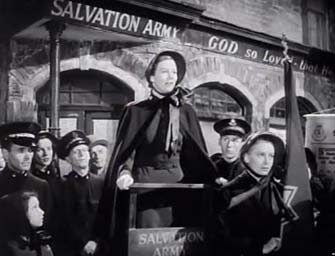 |
| Wendy Hiller as "Major Barbara." |
May 1941
May 1, 1941: British Hold Tobruk
May 2, 1941: Anglo-Iraq War
May 3, 1941: Liverpool Hammered
May 4, 1941: Hitler Victory Speech
May 5, 1941: Patriots Day
May 6, 1941: Stalin In Command
May 7, 1941: May Blitz
May 8, 1941: Pinguin Sunk
May 9, 1941: U-110 Captured
May 10, 1941: Hess Flies Into History
May 11, 1941: The Hess Peace Plan
May 12, 1941: Tiger Arrives Safely
May 13, 1941: Keitel's Illegal Order
May 14, 1941: Holocaust in Paris
May 15, 1941: Operation Brevity
May 16, 1941: Blitz Ends
May 17, 1941: Habbaniya Relieved
May 18, 1941: Croatia Partitioned
May 19, 1941: Bismarck at Sea
May 20, 1941: Invasion of Crete
May 21, 1941: Robin Moore Sinking
May 22, 1941: Royal Navy Destruction Off Crete
May 23, 1941: Crete Must Be Won
May 24, 1941: Bismarck Sinks Hood
May 25, 1941: Lütjens' Brilliant Maneuver
May 26, 1941: Bismarck Stopped
May 27, 1941: Bismarck Sunk
May 28, 1941: Crete Lost
May 29, 1941: Royal Navy Mauled Off Crete
May 30, 1941: Sorge Warns, Stalin Ignores
May 31, 1941: British Take Baghdad
2020


